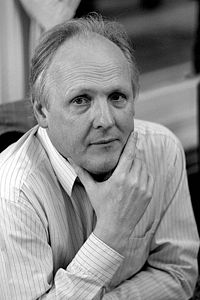Steve Furber | |
|---|---|
 Furber in 2009 | |
| Born | Stephen Byram Furber 21 March 1953[6] Manchester, England[7] |
| Education | Manchester Grammar School |
| Alma mater | University of Cambridge (BA, MMath, PhD)[6][8] |
| Known for | |
| Spouse |
Valerie Margaret Elliott
(m. 1977) |
| Awards |
|
| Scientific career | |
| Fields | |
| Institutions | |
| Thesis | Is the Weis-Fogh principle exploitable in turbomachines? (1979) |
| Doctoral advisor | John Ffowcs Williams[3][4] |
| Notable students | Simon Segars[5] |
| Website | apt manchester |
Stephen Byram Furber (born 21 March 1953)[6] is a British computer scientist, mathematician and hardware engineer, and Emeritus ICL Professor of Computer Engineering in the Department of Computer Science at the University of Manchester, UK.[12] After completing his education at the University of Cambridge (BA, MMath, PhD), he spent the 1980s at Acorn Computers, where he was a principal designer of the BBC Micro and the ARM 32-bit RISC microprocessor.[13] As of 2023[update], over 250 billion ARM chips have been manufactured, powering much of the world's mobile computing and embedded systems, everything from sensors to smartphones to servers.[14][15][16][8]
In 1990, he moved to Manchester to lead research into asynchronous circuits, low-power electronics[17] and neural engineering, where the Spiking Neural Network Architecture (SpiNNaker) project is delivering a computer incorporating a million ARM processors optimised for computational neuroscience.[2][18][19][20][21]
- ^ Cite error: The named reference
draperwas invoked but never defined (see the help page). - ^ a b c d Steve Furber publications indexed by Google Scholar
- ^ Steve Furber at the Mathematics Genealogy Project
- ^ Cite error: The named reference
furberphdwas invoked but never defined (see the help page). - ^ Segars, Simon Anthony (1996). Low power microprocessor design (MSc thesis). University of Manchester. OCLC 643624237. Copac 36604476.
- ^ a b c d Anon (2015). "Furber, Prof. Stephen Byram". Who's Who (online Oxford University Press ed.). A & C Black. doi:10.1093/ww/9780199540884.013.43464. (Subscription or UK public library membership required.)
- ^ Brown, David (1 February 2010). "A Conversation with Steve Furber". Queue. Association for Computing Machinery. Retrieved 7 March 2012.
- ^ a b Steve Furber's ORCID 0000-0002-6524-3367
- ^ Furber, S. B.; Galluppi, F.; Temple, S.; Plana, L. A. (2014). "The SpiNNaker Project". Proceedings of the IEEE. 102 (5): 652–665. doi:10.1109/JPROC.2014.2304638. S2CID 25268038.
- ^ "The Human Brain Project SP 9: Neuromorphic Computing Platform" on YouTube
- ^ Furber, Stephen B. (2000). ARM system-on-chip architecture (2 ed.). Boston: Addison-Wesley. ISBN 0-201-67519-6.
The design of a general-purpose processor, in common with most engineering endeavours, requires careful consideration of many trade-offs and compromises
- ^ "Prof Steve Furber CBE FRS FREng FBCS FIET CITP CEng – The University of Manchester". research.manchester.ac.uk.
- ^ Lean, Thomas (22 October 2012). "Steve Furber: developing ARM with no people and no money". British Library. Archived from the original on 10 November 2016. Retrieved 6 May 2014.
- ^ Anon (2023). "Arm is Everywhere Technology Matters: 250+ Billion Chips in Everything from Sensors to Smartphones to Servers". arm.com.
- ^ "Inside the numbers: 100 billion ARM-based chips". 27 February 2017.
- ^ "Enabling Mass IoT connectivity as Arm partners ship 100 billion chips". 27 February 2017.
- ^ Furber, Stephen B. (1989). VLSI RISC architecture and organization. New York: M. Dekker. ISBN 0-8247-8151-1.
- ^ Grier, D. A. (2014). "Steve Furber [Interviews]". IEEE Annals of the History of Computing. 36: 58–68. doi:10.1109/MAHC.2014.8. S2CID 28152764.
- ^ ARM and its Partners talk about reaching the 50 Billion chip milestone on YouTube
- ^ Steve Furber publications indexed by the Scopus bibliographic database. (subscription required)
- ^ National Life Stories, Professor Steve Furber Interviewed by Thomas Lean, British Library